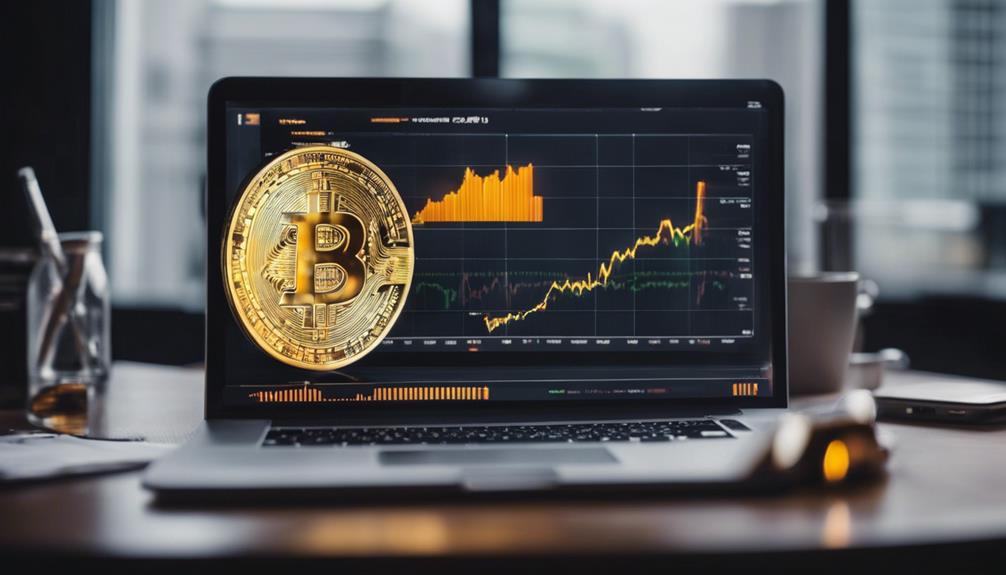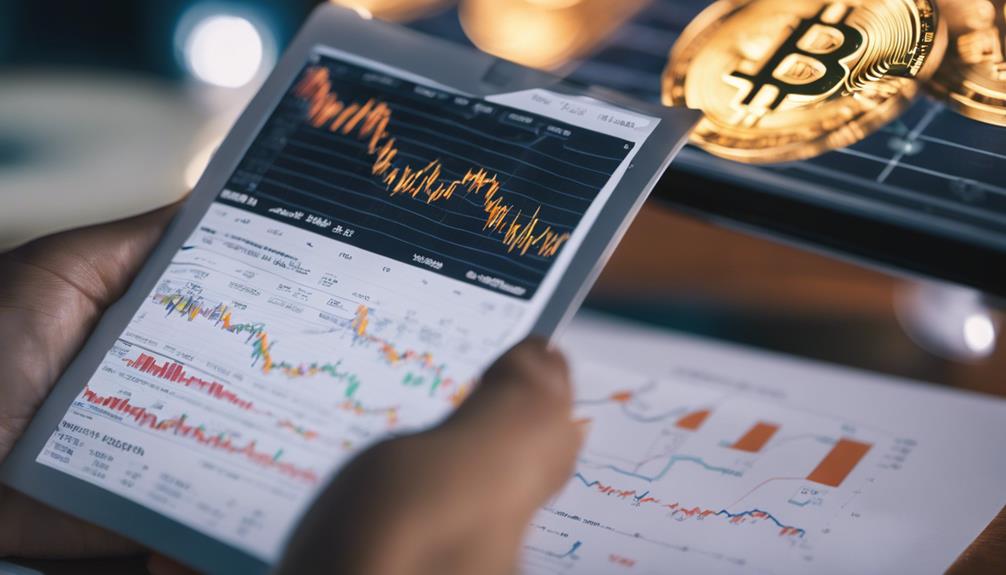Bitcoin IRA
Types of Bitcoin IRAs (Traditional, Roth, SEP, SIMPLE)
An overview of different Bitcoin IRA options including Traditional, Roth, SEP, and SIMPLE – discover which one suits your retirement needs best!

Traditional Bitcoin IRAs offer tax-deferred growth, pre-tax contributions, and mandatory distributions. Roth Bitcoin IRAs use after-tax dollars, provide tax-free distributions, and no minimum distributions. SEP Bitcoin IRAs suit self-employed individuals, offer higher contributions, and tax-deductible employer contributions. SIMPLE Bitcoin IRAs are for businesses, require earned income, and have lower contribution limits. Understanding these options' tax advantages and rules is essential for informed retirement planning. Choosing the right Bitcoin IRA depends on individual financial goals and circumstances, ensuring a secure retirement future. Explore the nuances of each type to maximize retirement savings potential.
Key Takeaways
- Traditional Bitcoin IRA offers tax-deferred growth and mandatory distributions.
- Roth Bitcoin IRA allows tax-free withdrawals in retirement and no required minimum distributions.
- SEP Bitcoin IRA caters to self-employed individuals with higher contribution limits.
- SIMPLE Bitcoin IRA is open to businesses of any size with lower contribution limits.
- Each type has distinct tax advantages and rules for contributions and distributions.
Traditional Bitcoin IRA

A Traditional Bitcoin IRA offers investors the opportunity to benefit from tax-deferred growth on their Bitcoin holdings while enjoying immediate tax advantages through contributions made with pre-tax dollars. By investing in Bitcoin through a Traditional IRA, individuals can potentially diversify their retirement savings and take advantage of the growth potential of this digital asset. Contributions to a Traditional Bitcoin IRA are subject to the same contribution limits and rules as Traditional IRAs for other assets, providing a structured framework for retirement planning.
One key consideration is that withdrawals from a Traditional Bitcoin IRA are taxed as ordinary income upon distribution. This tax treatment aligns with the traditional IRA structure and reinforces the long-term retirement savings goal of these accounts. Overall, a Traditional Bitcoin IRA can be a strategic tool for investors looking to incorporate Bitcoin into their retirement portfolio while benefiting from the tax advantages and growth potential associated with retirement accounts.
Roth Bitcoin IRA

Within a Roth Bitcoin IRA, contributions are made using after-tax dollars, offering potential tax-free distributions under specific conditions. This type of retirement account is suitable for individuals who anticipate being in higher tax brackets during retirement.
Unlike Traditional IRAs, contributions to a Roth Bitcoin IRA are not tax-deductible. One of the key advantages of a Roth Bitcoin IRA is that qualified distributions are tax-free, providing a valuable opportunity for long-term tax savings.
Additionally, Roth Bitcoin IRAs do not have required minimum distributions during the account holder's lifetime, allowing for more flexibility in managing retirement funds.
SEP Bitcoin IRA

The SEP Bitcoin IRA is tailored for self-employed individuals and small business owners, offering higher annual contribution limits than Traditional and Roth IRAs. Employers have the option to make tax-deductible contributions to SEP Bitcoin IRAs for eligible employees, providing a valuable retirement benefit.
This type of IRA allows for flexible annual contributions based on business profits and simplifies retirement planning with minimal filing or reporting requirements.
SEP IRA Basics
When considering retirement planning options, self-employed individuals and small businesses often turn to SEP IRAs, a Simplified Employee Pension IRA that offers higher annual contribution limits and tax benefits.
- A SEP IRA is a retirement plan designed for self-employed individuals and small businesses.
- It allows for higher annual contribution limits compared to other types of IRAs.
- Employers can make tax-deductible contributions to their employees' SEP IRAs.
- SEP IRAs have simplified management with minimal reporting requirements.
- These retirement plans provide flexibility and potential tax benefits for individuals looking to save for retirement effectively.
SEP Bitcoin Benefits
For self-employed individuals and small business owners seeking enhanced retirement savings options, SEP Bitcoin IRAs provide a tax-efficient and flexible investment vehicle. These accounts offer higher contribution limits, making them advantageous for those looking to maximize retirement savings. With SEP Bitcoin IRAs, employer contributions are tax-deductible, offering additional tax advantages. Unlike some retirement accounts, SEP Bitcoin IRAs do not have reporting requirements, simplifying the retirement planning process for account holders. The flexibility and tax benefits of SEP Bitcoin IRAs make them a valuable tool for self-employed individuals and small business owners aiming to secure their financial future through efficient retirement planning.
| Features | Benefits |
|---|---|
| Higher contribution limits | Maximize retirement savings |
| Tax-deductible contributions | Tax advantages |
| Employer contributions | Additional savings |
| No reporting requirements | Simplified retirement planning process |
SIMPLE Bitcoin IRA

A SIMPLE Bitcoin IRA offers a streamlined retirement savings option for small businesses and their employees.
Eligibility criteria, contribution limits, and withdrawal rules are important aspects to take into account when establishing a SIMPLE Bitcoin IRA.
Eligibility Criteria for SIMPLE Bitcoin IRA
Eligibility for a SIMPLE Bitcoin IRA, a retirement account allowing contributions by both employees and employers to Traditional IRAs, is open to businesses of any size seeking to provide a retirement plan for their employees. To qualify for a SIMPLE Bitcoin IRA, employees must have earned income, and employers must establish a SIMPLE IRA plan.
Contributions to this IRA are made through salary deferrals and employer contributions. Specific IRS requirements must be met, including using IRS Form 5305/5304-SIMPLE to establish the plan.
It provides a straightforward way for businesses to offer a retirement savings option to their employees, encouraging long-term financial security.
Contribution Limits for SIMPLE Bitcoin IRA
When considering a SIMPLE Bitcoin IRA, it is important to be aware of the specific contribution limits that apply to this retirement account. In 2023 and 2024, the contribution limit for individuals under 50 years old stands at $13,500.
Those aged 50 and over have the opportunity to make catch-up contributions of up to $3,000, allowing for a total contribution limit of $16,500. Employers can also contribute to a SIMPLE Bitcoin IRA, with a maximum matching contribution of 3% of the employee's compensation.
The combined total annual contribution limit, inclusive of both employee and employer contributions, must not exceed $28,000 for individuals under 50 and $34,500 for those aged 50 and over. Understanding these contribution limits is essential for maximizing retirement savings within the IRS guidelines.
Withdrawal Rules for SIMPLE Bitcoin IRA
Withdrawal regulations governing a SIMPLE Bitcoin IRA entail adherence to specific guidelines established by the IRS.
- Early withdrawals before age 59.5 may incur a 10% penalty.
- Required minimum distributions (RMDs) start at age 72 for SIMPLE Bitcoin IRAs.
- Withdrawals are taxed as ordinary income based on the account holder's tax bracket.
- Consult IRS regulations and your financial advisor for specific withdrawal details regarding a SIMPLE Bitcoin IRA.
Tax Advantages and Contribution Rules

Bitcoin IRAs present investors with a range of tax advantages and contribution rules tailored to different financial goals and circumstances. Traditional Bitcoin IRAs offer immediate tax savings on contributions, allowing investors to deduct their contributions from their taxable income.
On the other hand, Roth Bitcoin IRAs provide tax-free growth and withdrawals, making them an attractive option for those looking to maximize long-term gains. SEP Bitcoin IRAs cater to self-employed individuals with higher contribution limits, allowing them to save more for retirement.
SIMPLE Bitcoin IRAs, designed for small businesses, offer easy management and a straightforward setup process. These different types of Bitcoin IRAs provide investors with various options to suit their specific needs while benefiting from the tax advantages and long-term growth potential that these accounts offer.
Understanding the tax advantages and contribution rules of each type of account is essential for making informed decisions about retirement planning and maximizing the benefits of Bitcoin IRAs.
Choosing the Right Bitcoin IRA

In determining the most suitable Bitcoin IRA for your financial portfolio, it is important to carefully assess your individual financial goals and circumstances. When choosing between Traditional, Roth, SEP, or SIMPLE Bitcoin IRAs, consider the following:
- Evaluate your tax situation to determine the immediate tax savings offered by Traditional Bitcoin IRAs versus the tax-free growth potential of Roth Bitcoin IRAs.
- Assess your long-term investment objectives to align with the features of SEP Bitcoin IRAs, which cater to self-employed individuals with higher contribution limits.
- Consider SIMPLE Bitcoin IRAs, which are tailored for small businesses seeking retirement options with specific benefits.
- Research and compare the unique features, benefits, and requirements of each type of Bitcoin IRA to make an informed decision that suits your needs.
- Keep in mind that selecting the right Bitcoin IRA involves understanding the nuances of each type and how they align with your financial objectives and circumstances.
Frequently Asked Questions
What Are the Four Basic Types of Iras?
The four basic types of IRAs are Traditional, Roth, SEP, and SIMPLE. Traditional IRAs involve tax-deferred growth, allowing pre-tax contributions and taxing withdrawals.
Roth IRAs offer tax-free growth and tax-free withdrawals on after-tax contributions.
SEP IRAs provide higher contribution limits for self-employed individuals and are employer-sponsored.
SIMPLE IRAs enable employees and employers to contribute to Traditional IRAs with simplified rules.
Each IRA type caters to different retirement planning needs and goals.
Is Bitcoin IRA a Traditional Ira?
Yes, a Bitcoin IRA can be structured as a Traditional IRA. This means that it follows the rules and regulations set for Traditional IRAs while allowing individuals to hold Bitcoin as the primary asset within the IRA.
Contributions to a Bitcoin Traditional IRA are typically made with pre-tax dollars, offering the potential for tax deductions and tax-deferred growth. This tax-efficient approach makes Bitcoin Traditional IRAs a popular choice for retirement planning.
Is SEP IRA Traditional or Roth?
A SEP IRA is a type of Traditional IRA, not a Roth IRA. It shares similarities with a Traditional IRA regarding tax-deductible contributions.
Designed for self-employed individuals and small business owners, a SEP IRA offers higher contribution limits compared to Traditional and Roth IRAs. However, unlike Roth IRAs, SEP IRAs do not provide tax-free withdrawals in retirement.
It is important to understand these distinctions when considering retirement investment options.
Can I Buy Bitcoin With SEP Ira?
Investing in Bitcoin with a SEP IRA is feasible, offering potential tax advantages and growth opportunities. SEP IRAs cater to self-employed individuals and small business owners, presenting higher contribution limits for Bitcoin investments.
Diversifying your retirement portfolio with Bitcoin via a SEP IRA can leverage the cryptocurrency's growth potential. Adherence to IRS guidelines is vital to guarantee compliance and maximize benefits when utilizing a SEP IRA for Bitcoin investments.
What are the different types of Bitcoin IRAs available and how do they differ from each other?
When exploring bitcoin IRA landscape, investors will find different types of Bitcoin IRAs available, such as traditional IRAs, Roth IRAs, and SEP IRAs. Each type differs in terms of contribution limits, tax treatment, and eligibility requirements. It’s important to understand these differences before choosing the right Bitcoin IRA for your investment goals.
Conclusion
In conclusion, Bitcoin IRAs offer a variety of options such as Traditional, Roth, SEP, and SIMPLE IRAs, each with its own tax advantages and contribution rules. It is essential to carefully consider your financial goals and retirement plans when choosing the right Bitcoin IRA for your needs. By understanding the differences between these types of IRAs, you can make informed decisions to secure your financial future.
[ANTICIPATED OBJECTION VISUAL REPRESENTATION]:
Some may argue that Bitcoin IRAs are too risky, but by diversifying your investment portfolio and staying informed about market trends, you can mitigate potential risks and maximize your returns over time.

Bitcoin IRA
Is a Bitcoin IRA Right for You? Evaluating Your Risk Tolerance and Retirement Goals
Considering a Bitcoin IRA? Assess your risk tolerance and retirement goals to determine suitability – find out how to optimize potential gains and benefits.

Understanding your risk tolerance and aligning your retirement goals are essential when considering a Bitcoin IRA. Assess factors like financial objectives and comfort with market volatility to determine suitability and asset allocation. Tailoring investments to match long-term plans optimizes success. Bitcoin IRAs offer potential gains due to impressive historical performance and diversification benefits. However, consider Bitcoin's price volatility, daily fluctuations, and market dynamics. Integrating Bitcoin can provide growth opportunities and tax advantages, but evaluating risk tolerance is key. Make informed decisions by aligning investments with your retirement aspirations and understanding the potential benefits of a Bitcoin IRA.
Key Takeaways
- Assess risk tolerance to determine Bitcoin IRA suitability.
- Align investments with retirement goals for long-term success.
- Consider potential gains from Bitcoin's historical performance.
- Understand and manage volatility within a Bitcoin IRA.
- Evaluate incorporating Bitcoin for portfolio diversification and growth.
Understanding Risk Tolerance for Bitcoin IRA

Evaluating your risk tolerance is a fundamental step in determining the suitability of a Bitcoin IRA for your investment portfolio. Risk tolerance refers to your ability and willingness to endure fluctuations in the value of your investments, including those within a Bitcoin IRA. Factors such as your financial goals, time horizon, current financial situation, and comfort level with market volatility all play an important role in determining your risk tolerance.
Understanding your risk tolerance is essential as it helps in deciding the appropriate asset allocation within your Bitcoin IRA that aligns with your comfort level. Gauging your risk tolerance can be done through questionnaires provided by financial advisors or online tools, enabling you to accurately gauge your risk appetite.
Evaluating your risk tolerance for a Bitcoin IRA ensures that your investment aligns with your financial objectives and comfort level concerning market fluctuations. By taking this step, you can make informed decisions that suit your risk profile and long-term investment goals.
Aligning Investments With Retirement Goals

In order to effectively align investments with retirement goals, careful consideration of factors such as risk tolerance, time horizon, and desired financial outcomes is essential.
When evaluating the suitability of a Bitcoin IRA for retirement planning, it is imperative to understand how this investment vehicle can assist in achieving specific long-term financial goals.
By evaluating the relationship between risk tolerance and investment strategies, individuals can tailor their Bitcoin IRA investments to align with their retirement objectives effectively. This alignment not only optimizes the potential for long-term financial success but also guarantees that investment decisions are in line with individual financial needs and aspirations.
Evaluating Bitcoin IRA Potential Gains

Bitcoin IRA offers the potential for substantial gains, backed by Bitcoin's impressive historical performance and promising future outlook. With an average return of 1,576% and a total return of 18,912% from 2010 to 2021, Bitcoin has proven itself as a lucrative investment option. Additionally, industry experts like Cathie Wood predict that Bitcoin's price could surpass $1 million by 2030, indicating significant growth potential for this digital asset. The cryptocurrency has historically increased in value after each halving cycle, further supporting the notion of future appreciation.
One key factor contributing to Bitcoin's price appreciation over time is the continuously rising mining hashrate. As the mining process becomes more challenging and resource-intensive, the scarcity of Bitcoin increases, potentially driving its value higher. Given Bitcoin's status as one of the best-performing assets of the 21st century, investing in a Bitcoin IRA presents an opportunity for individuals seeking to diversify their retirement portfolio and capitalize on the growth potential of digital assets.
Assessing Volatility in Bitcoin IRA

Evaluating the fluctuating nature of Bitcoin's value within an IRA requires a vital understanding of the market dynamics and risk factors associated with this digital asset. Bitcoin's price volatility, with daily fluctuations exceeding 10%, poses a significant risk for investors considering a Bitcoin IRA. In 2021 alone, the cryptocurrency's price swung from approximately $30,000 to over $60,000, underscoring its inherent unpredictability. Historical data reveals that Bitcoin has undergone severe price corrections of over 80% in the past, showcasing the high level of risk involved in investing in this cryptocurrency.
Factors such as market demand, regulatory news, macroeconomic conditions, and investor sentiment heavily influence Bitcoin's volatility. Evaluating this volatility is essential when determining the suitability of Bitcoin within an IRA, aligning with one's risk tolerance and long-term retirement goals. As Bitcoin's value can be volatile and subject to market forces, investors must carefully consider whether this digital asset fits into their retirement investment strategy for the long term.
Incorporating Bitcoin Into Retirement Portfolio

Considering the potential benefits and risks associated with integrating Bitcoin into a retirement portfolio is a key move for investors seeking diversification and growth opportunities. By incorporating digital assets like Bitcoin into a retirement portfolio, investors can potentially achieve high returns and add a layer of diversification. Bitcoin's historical growth trends and the increasing acceptance of cryptocurrencies as an asset class make it an appealing option for retirement savings. Moreover, Bitcoin IRAs offer tax advantages, providing investors with an opportunity to invest in a growing digital asset while potentially reducing their tax burdens.
However, it's important for investors to evaluate their risk tolerance before including Bitcoin in their retirement portfolio. While Bitcoin can offer significant growth potential, its volatility and market fluctuations can also pose risks. Understanding the risks and rewards associated with Bitcoin investments is essential for making informed decisions about incorporating it into a retirement portfolio. Ultimately, for investors looking to diversify their retirement holdings and potentially benefit from the growth of digital assets, including Bitcoin in a retirement portfolio could be a viable option worth considering.
Frequently Asked Questions
Is It a Good Idea to Have a Bitcoin Ira?
Investing in a Bitcoin IRA can be a strategic move for those seeking exposure to the potential growth of Bitcoin within a retirement account. The decision should be based on factors like risk tolerance, investment goals, and time horizon.
Carefully assessing the risks and advantages of Bitcoin IRAs is crucial to determine if they align with your investment objectives and long-term financial plans. Consulting with a financial advisor can provide valuable insights tailored to your individual circumstances.
Is Bitcoin a Good Retirement Plan?
Bitcoin can be a viable component of a retirement plan due to its historical growth trends, potential for price appreciation, and diversification benefits. Its unique characteristics, including acting as a hedge against inflation and exposure to the cryptocurrency industry, make it an attractive option for long-term investment.
Additionally, tax advantages associated with investing in Bitcoin within retirement accounts can provide a compelling opportunity for individuals looking to enhance their retirement portfolios.
How Much Does Bitcoin IRA Charge?
Bitcoin IRA charges an annual account fee of $240, equivalent to $20 per month. Transaction fees for cryptocurrency trades typically range from 1.5% to 2%. Additionally, a custodian fee of 0.1% per year, based on the account value, and storage fees of 0.1% to 0.2% annually for secure wallet storage are applicable.
Is Bitcoin IRA Insured?
Bitcoin IRA is protected through AIS dba BitcoinIRA's $5 Million professional liability insurance policy. This insurance coverage safeguards investors by providing security against certain risks within the platform. It adds an additional layer of protection for retirement savings.
The policy safeguards customer investments, enhancing confidence in the platform's security measures. This insurance guarantees peace of mind for investors utilizing Bitcoin IRA for their retirement planning needs.
How Can I Assess If a Bitcoin IRA Is Right for Me Based on My Risk Tolerance and Retirement Goals?
When evaluating whether a Bitcoin IRA is suitable for you, understanding Bitcoin IRAs types is crucial to aligning with your risk tolerance and retirement goals. By considering the different types and their associated risks and potential returns, you can make an informed decision that fits your investment objectives.
Conclusion
To wrap up, contemplating a Bitcoin IRA necessitates a comprehensive evaluation of:
- Risk tolerance
- Retirement goals
- Potential gains
- Volatility
- Portfolio diversification
By aligning investments with retirement objectives and incorporating Bitcoin strategically, investors can make informed decisions about their financial future.
It is crucial to weigh the benefits and risks carefully to guarantee a balanced and secure retirement plan. Committing to thorough research and prudent decision-making will result in a well-rounded approach to retirement investing with Bitcoin IRAs.
Bitcoin IRA
Weathering Market Fluctuations: Tips for Managing Volatility in Your Bitcoin IRA
Tackle market volatility in your Bitcoin IRA with expert tips for maximizing returns and safeguarding your investments.

To manage volatility in your Bitcoin IRA, consider factors like market sentiment, regulations, and investor behavior. Risk management is vital for capital protection and returns maximization. Diversification across cryptocurrencies can reduce risk and enhance stability. Clear investment goals based on risk tolerance and time horizon are essential. Adopt a long-term perspective, embracing patience and compound interest benefits. Stay informed about regulatory changes to anticipate market shifts effectively. Manage liquidity to execute transactions swiftly and mitigate market impact. Learn to navigate market fluctuations effectively in your Bitcoin IRA to secure long-term growth.
Key Takeaways
- Diversify your cryptocurrency investments to spread risk and increase stability.
- Set clear investment goals aligned with risk tolerance and time horizon.
- Maintain a long-term perspective to benefit from compound interest and wealth accumulation.
- Stay informed and adapt to regulatory changes promptly to protect your investments.
- Manage liquidity effectively to ensure smooth transactions and mitigate market fluctuations.
Understanding Bitcoin IRA Volatility

Bitcoin IRA volatility is a complex phenomenon influenced by various factors such as market sentiment, regulatory changes, technological developments, and investor behavior. Market sentiment, driven by news events and social media trends, can trigger rapid price swings in Bitcoin IRA accounts. Understanding the psychological aspects of market sentiment is vital for managing volatility in Bitcoin IRAs, as investor emotions and perceptions can heavily impact asset prices.
Moreover, technological developments and innovations in blockchain technology play a significant role in determining the value of Bitcoin in IRAs. These advancements can enhance security, scalability, and efficiency, affecting the overall market dynamics. Additionally, regulatory changes and legal uncertainties can create fluctuations in the value of Bitcoin IRAs. Changes in laws or government policies can lead to sudden shifts in the cryptocurrency market, impacting investors' portfolios.
Therefore, staying informed about market sentiment, technological advancements, regulatory changes, and investor behavior is essential for effectively handling the volatility inherent in Bitcoin IRAs.
Importance of Risk Management

Implementing effective risk management practices is vital for safeguarding capital and maximizing returns in a Bitcoin IRA. By evaluating and addressing risks, investors can align their investment strategies with long-term financial goals, reducing the impact of market fluctuations.
Diversification and risk mitigation strategies play an important role in managing risk within a Bitcoin IRA. These strategies involve spreading investments across different asset classes to create a more resilient portfolio. Regularly monitoring and adjusting risk levels can further enhance portfolio resilience, allowing investors to navigate market volatility with greater ease.
With proper risk management, investors can not only protect their capital but also seize opportunities for growth in their Bitcoin IRA. By staying informed, diversifying their investments, and actively managing risk, individuals can position themselves for long-term success in the cryptocurrency market.
Diversification Strategies in Cryptocurrency

Diversifying your cryptocurrency investments across various digital assets is a strategic approach to reducing risk and maximizing portfolio stability in the volatile crypto market. By spreading your investments across different cryptocurrencies, you can mitigate the impact of price fluctuations in any single asset. This diversification strategy aims to balance risk and potential returns, enhancing the overall stability of your crypto investment portfolio.
Allocating funds across a variety of cryptocurrencies not only helps in risk management but also provides exposure to different market segments and technologies within the cryptocurrency space. A diversified portfolio in crypto can offer a level of protection against extreme market fluctuations that may affect individual digital assets. Considering diversification as a key component of your cryptocurrency investment strategy can help navigate the dynamic nature of the market and potentially improve long-term portfolio performance.
Setting Clear Investment Goals

When establishing your investment strategy for a Bitcoin IRA, it is important to begin by clearly defining your specific and measurable investment objectives. To effectively set clear investment goals, consider the following:
- Define Your Investment Objectives: Clearly outline whether your goal is wealth accumulation, income generation, or capital preservation to tailor your strategy accordingly.
- Assess Your Risk Tolerance: Understand how much risk you are willing to take on and align it with your investment objectives to guarantee a balanced approach.
- Evaluate Your Time Horizon: Consider factors like your retirement age, income needs, and growth expectations to determine the timeline for achieving your investment goals.
Long-Term Perspective for Success

Maintaining a long-term perspective is vital for success in managing the volatility of a Bitcoin IRA. By exercising patience and enduring through market fluctuations, investors can stay focused on their overarching financial goals.
Long-term investment strategies not only help in handling volatility but also tend to produce more favorable outcomes in the domain of Bitcoin IRAs.
Patience in Investments
With a long-term perspective in investments, success and wealth accumulation can be greatly enhanced. Patience is vital in allowing investments to grow steadily over time. Here are three key points to keep in mind:
- Compound Interest: Harnessing the power of compound interest can greatly boost the value of long-term investments.
- Consistent Investment Discipline: Maintaining a disciplined approach to investing helps in achieving financial objectives in the long run.
- Wealth Accumulation: Emphasizing long-term goals over short-term gains can lead to substantial wealth accumulation.
Endurance Through Volatility
Enduring through market volatility is essential for long-term success in managing a Bitcoin IRA, requiring a steadfast focus on weathering fluctuations and staying committed to strategic investment principles. Maintaining a long-term perspective allows investors to navigate short-term price swings and capitalize on the growth potential of Bitcoin. A disciplined and strategic approach involves understanding that temporary market fluctuations are normal in the long-term trajectory of Bitcoin. By staying disciplined and avoiding emotional reactions to short-term price movements, investors can adhere to a long-term investment strategy that leads to success in managing volatility within a Bitcoin IRA. The table below summarizes key points for enduring through volatility in a Bitcoin IRA:
| Key Points |
|---|
| Long-term perspective |
| Short-term price swings |
| Growth potential |
| Strategic approach |
| Disciplined |
Monitoring Market Sentiment

Market sentiment plays a pivotal role in the unpredictable world of cryptocurrency investments.
By utilizing sentiment analysis tools and closely monitoring social media trends, investors can gain insights into the market's emotional landscape.
Reacting to shifts in sentiment allows investors to make informed decisions in maneuvering the volatile Bitcoin IRA market.
Sentiment Analysis Tools
Sentiment analysis tools, powered by natural language processing algorithms, provide invaluable insights into market sentiments towards Bitcoin and other cryptocurrencies by monitoring various online sources.
Key Points:
- Monitoring Social Media: These tools scan platforms like Twitter, Reddit, and forums to gauge public opinions on cryptocurrencies.
- Analyzing Sentiment Trends: By tracking sentiment trends, investors can anticipate market mood shifts and potential price movements.
- Data-Driven Insights: Sentiment analysis tools offer data-driven insights, helping traders make informed decisions based on collective market sentiments.
Social Media Monitoring
Social media monitoring plays a significant role in understanding market sentiment towards Bitcoin IRA by tracking online conversations and trends. By analyzing investor attitudes and opinions shared on social platforms, sentiment analysis tools can interpret whether sentiments are positive or negative towards Bitcoin IRA.
This monitoring helps investors stay informed about potential market shifts that could impact their investments. Utilizing real-time sentiment analysis from social media can aid in making informed decisions and adjusting investment strategies accordingly. It provides valuable insights into emerging trends and news that may affect Bitcoin IRA volatility.
Keeping a close eye on social media conversations allows investors to gauge the overall market sentiment and make educated decisions regarding their Bitcoin IRA holdings.
Reacting to Regulatory Changes

Traversing the evolving regulatory landscape is vital for Bitcoin IRA investors aiming to proactively respond to changes in legislation and policy. Understanding the implications of regulatory changes is essential for managing volatility and making informed decisions within a Bitcoin IRA.
Here are three key points to keep in mind when reacting to regulatory changes:
- Stay Informed: Stay updated on regulatory changes, government crackdowns, and legal frameworks that may impact your Bitcoin IRA. Being aware of policy shifts can help you anticipate market reactions and potential price fluctuations.
- Adapt Quickly: Legal uncertainty surrounding cryptocurrencies can create challenges, so be prepared to adapt swiftly to new regulations. A proactive approach to compliance can help mitigate risks and protect your investments.
- Global Monitoring: Monitor global regulatory developments to navigate the regulatory landscape effectively. Understanding the international regulatory environment can provide insights into how changes may affect your Bitcoin IRA.
Liquidity Management in Bitcoin IRA

Effective liquidity management is essential for maintaining a well-functioning Bitcoin IRA. It ensures seamless trading operations and minimizes the impact of market fluctuations on portfolio value. In a Bitcoin IRA, liquidity management involves overseeing the availability of buyers and sellers to facilitate trades without significant price slippage. Adequate liquidity enables swift and efficient execution of transactions within the IRA, contributing to the overall stability of the portfolio.
High liquidity levels within a Bitcoin IRA can help mitigate the adverse effects of market fluctuations on the account's value. Conversely, low liquidity may result in wider bid-ask spreads and potential difficulties in buying or selling assets within the IRA. Regularly monitoring liquidity levels is vital to evaluate the ease of trading and effectively manage volatility in a Bitcoin IRA.
Frequently Asked Questions
What Is the Best Way to Deal With Volatility?
When dealing with volatility, it is important to diversify your Bitcoin IRA portfolio, spreading risk across various assets. Implement risk management strategies like setting stop-loss orders to safeguard investments.
Stay informed about market trends and news affecting Bitcoin prices. Consider dollar-cost averaging to mitigate market fluctuations.
Focus on long-term objectives to prevent impulsive decisions based on short-term changes. These approaches can help navigate volatility and enhance the stability of your Bitcoin IRA.
How Do You Manage Investments Through Market Volatility?
To effectively manage investments through market volatility, key strategies include:
- Diversification: Spreading risk by diversifying your Bitcoin IRA.
- Stop-loss orders: Protecting investments through strategic orders.
- Dollar-cost averaging: Mitigating price fluctuations with consistent investments.
- Staying informed on market trends and regularly reviewing and adjusting your investment strategy based on risk tolerance and financial goals.
These practices collectively enhance investment resilience in the face of market fluctuations.
How Do I Make My Portfolio Less Volatile?
To make your portfolio less volatile, consider diversifying across different cryptocurrencies and asset classes, including stablecoins for stability. Implement risk management tactics such as stop-loss orders and regular portfolio rebalancing.
Stay informed about market trends, regulations, and technology advancements. Collaborate with a cryptocurrency investment specialist to create a tailored strategy for managing volatility in your Bitcoin IRA. This approach can help mitigate risks and enhance the overall stability of your portfolio.
How to Avoid Market Fluctuations?
In managing market fluctuations within your Bitcoin IRA, diversification across different cryptocurrencies and stable assets can help reduce exposure to volatility.
Utilizing stop-loss orders to set predetermined selling prices can limit potential losses during turbulent times.
Regularly reviewing and adjusting your investment strategy to align with market dynamics and staying informed about trends and regulatory changes are key practices to effectively manage market fluctuations in your Bitcoin IRA.
How Can Different Types of Bitcoin IRAs Help in Managing Market Fluctuations?
When it comes to managing market fluctuations, having a diverse portfolio is key. This is where bitcoin IRA options explained come into play. By having different types of bitcoin IRAs, such as traditional, Roth, or self-directed, investors can hedge against market volatility and potentially see greater returns in the long run.
Conclusion
To sum up, effectively managing volatility in a Bitcoin IRA requires understanding:
- Risk
- Diversification
- Goal-setting
- A long-term perspective
- Market sentiment monitoring
- Reacting to regulatory changes
- Liquidity management
By implementing these strategies, investors can weather market fluctuations and secure their retirement funds.
Remember, staying informed and proactive is key to successfully maneuvering the ever-changing landscape of cryptocurrency investments. With diligence and patience, success in a Bitcoin IRA is within reach, even in the face of extreme market swings.
Bitcoin IRA
Retirement Planning in the Age of Crypto: Assessing the Risks and Rewards of Bitcoin IRAs
Only by exploring Bitcoin IRAs can you unlock the potential for tax benefits, inflation hedging, and portfolio diversification in retirement planning.

In the domain of retirement planning in the age of cryptocurrencies, Bitcoin IRAs offer unique opportunities and risks. They provide tax benefits similar to traditional IRAs, act as a hedge against inflation, and allow for portfolio diversification. However, volatility, regulatory uncertainties, and security threats are significant risks to take into account. Mitigation strategies involve diversification and selecting reputable custodians. Understanding tax implications and selecting a custodian are vital initial steps. To assess if Bitcoin IRAs suit your retirement strategy, weigh the growth potential against market complexities and align investments with your long-term financial goals. Benefit from innovative blockchain technologies and potential asset appreciation.
Key Takeaways
- Bitcoin IRAs offer tax advantages and diversification for retirement.
- Risks include volatility, regulatory uncertainties, and security threats.
- Mitigate risks through diversification and reputable custodians.
- Consider tax implications, fees, and long-term investment horizon.
- Growth potential from exposure to blockchain technology and asset appreciation.
Understanding Bitcoin IRAs

When considering retirement planning, it is important to understand the concept and mechanics of Bitcoin IRAs. These self-directed retirement accounts offer investors the opportunity to include Bitcoin in their portfolios. Bitcoin IRAs can be either custodial or non-custodial, providing varying levels of control over assets. Similar to traditional IRAs, Bitcoin IRAs offer tax benefits such as tax-deferred growth and potential advantages upon retirement. However, investors should be aware of associated fees, including account setup, maintenance, and transaction fees.
In setting up a Bitcoin IRA, individuals must carefully assess factors such as risk tolerance and diversification strategies. Understanding one's risk tolerance is vital in determining the appropriate allocation of Bitcoin within the overall retirement portfolio. Diversification strategies should be employed to mitigate risks and optimize returns. Additionally, choosing a reputable custodian is critical to ensure the security and legitimacy of the Bitcoin IRA. By considering these factors, investors can make informed decisions to maximize potential returns while effectively managing risks associated with Bitcoin IRAs.
Benefits of Bitcoin IRAs

Bitcoin IRAs provide a range of benefits for investors seeking to enhance their retirement planning strategies. These benefits include:
- Tax Advantages: Bitcoin IRAs offer tax benefits similar to traditional IRAs, allowing for tax-deferred growth.
- Hedge Against Inflation: Investors can protect their retirement savings from the eroding effects of inflation by holding Bitcoin in their retirement accounts.
- Diversification: By diversifying a retirement portfolio with Bitcoin IRAs, investors can potentially achieve high returns and reduce overall risk.
- Reputable Custodians: Working with trustworthy custodians guarantees the security and legitimacy of the investment, providing peace of mind for investors.
- Long-Term Investment Horizon: Bitcoin IRAs are suited for a long-term investment horizon, allowing investors to capitalize on the growth potential of cryptocurrencies over time.
Risks and Mitigation Strategies

Amidst the dynamic landscape of cryptocurrency investments, it is imperative for individuals considering Bitcoin IRAs to carefully assess the associated risks and implement strategic mitigation measures. Risks inherent in Bitcoin IRAs include volatility, regulatory uncertainty, security threats, and liquidity issues.
To address these challenges, investors can employ various mitigation strategies. Diversification of investments is a vital tactic to spread risk across different assets and reduce the impact of market fluctuations on the overall portfolio. Choosing reputable custodians can enhance security measures and safeguard investments against potential threats such as hacking and phishing attacks.
Additionally, maintaining a long-term investment horizon can help navigate regulatory uncertainties in the cryptocurrency space, which may influence the value and legality of Bitcoin IRAs. Moreover, being mindful of liquidity issues is essential, as a lack of buyers or sellers in the market can hinder the ability to trade Bitcoin within an IRA effectively.
Tax Considerations for Bitcoin IRAs

Given the tax benefits similar to traditional IRAs, understanding the tax implications of Bitcoin IRAs is essential for optimizing savings and avoiding potential issues. Bitcoin IRAs offer tax-deferred growth and potential tax advantages, making them a valuable retirement investment vehicle.
When considering Bitcoin IRAs, individuals should be aware of the following tax considerations:
- Gains from Bitcoin investments in IRAs are taxed at retirement, allowing for tax-deferred growth over time.
- Consultation with a tax professional is recommended to navigate the tax implications effectively.
- Tax-efficient strategies can be implemented to maximize returns and manage tax liabilities.
- Understanding the tax implications is vital to optimize tax savings and ensure compliance with regulations.
- Bitcoin IRAs provide retirement tax benefits similar to traditional IRAs, emphasizing the importance of strategic tax planning for long-term financial security.
Choosing a Custodian

When opting for a custodian for your Bitcoin IRA, it is crucial to take into account factors such as custodian selection tips and security measures checklist.
These elements can assist investors in evaluating the reliability and trustworthiness of the custodian, ensuring the secure storage and management of their digital assets.
Custodian Selection Tips
In the domain of Bitcoin IRAs, selecting a custodian demands careful consideration of factors such as reputation, security protocols, and fee structures. When choosing a custodian for a cryptocurrency IRA, it is important to assess the custodian's ability to provide secure storage solutions, including options like cold storage and insurance coverage. To make an informed decision, compare custodians based on their reputation, regulatory compliance, and transparent fee structures.
Look for custodians with a strong track record in managing digital assets, positive customer reviews, and a demonstrated commitment to regulatory requirements. Make sure that the custodian you choose has a reliable reputation in the industry, a history of secure asset management, and clear fee structures for handling Bitcoin IRAs.
- Reputation
- Security protocols
- Fee structures
- Regulatory compliance
- Insurance coverage
Security Measures Checklist
Selecting a custodian for your Bitcoin IRA necessitates prioritizing robust security measures to safeguard your digital assets effectively. When choosing a Bitcoin IRA custodian, look for providers that offer cold storage solutions for private keys and utilize multi-signature wallets to enhance security.
It is important to verify that the custodian has insurance coverage to protect against potential losses from hacks or theft. Additionally, confirm the custodian adheres to cybersecurity best practices and industry standards to safeguard your investments.
Prioritize custodians with a proven track record of protecting client assets and maintaining high levels of security. By following these guidelines and selecting a custodian that implements strong security measures, you can better secure your Bitcoin IRA and mitigate risks associated with digital asset investments.
Self-Directed Vs Full-Service

Investors have the choice between self-directed and full-service Bitcoin IRAs for managing their cryptocurrency investments within a retirement account. When deliberating between the two options, individuals need to contemplate several key factors:
- Self-directed Bitcoin IRAs: Investors have control over their cryptocurrency investments within the retirement account, allowing for a hands-on approach to investment management.
- Full-service Bitcoin IRAs: Professional guidance and management are provided, catering to investors who prefer a more passive investment strategy.
- Fees: Self-directed accounts may incur higher fees due to the responsibility of managing investments independently, whereas full-service IRAs may charge fees for their expert guidance.
- Market Trends: Full-service IRAs offer insights into cryptocurrency market trends and potential investment opportunities, which can be beneficial for investors seeking expert advice.
- Comfort Level: Investors should assess their comfort level with managing cryptocurrency investments to determine whether a self-directed or full-service Bitcoin IRA is more suitable for their retirement planning.
Getting Started With a Bitcoin IRA

To start on the journey of establishing a Bitcoin IRA, individuals must first identify a reputable custodian specializing in self-directed IRA services for cryptocurrencies. Understanding IRS regulations, risk assessment, and diversification strategies is important for investors venturing into the domain of Bitcoin IRAs. This table outlines key steps for getting started with a Bitcoin IRA:
| Step | Description | Importance |
|---|---|---|
| Find a reputable custodian | Locate a trustworthy provider offering self-directed IRA services for Bitcoin investments. | Essential |
| Understand IRS regulations | Comprehend the tax implications and rules set forth by the IRS for Bitcoin within retirement accounts. | Crucial |
| Assess risk tolerance | Evaluate individual risk appetite to determine suitable investment strategies for a Bitcoin IRA. | Critical |
Best Practices for Management

Effective management practices are essential for optimizing a crypto retirement portfolio, ensuring long-term growth and risk mitigation. To navigate the financial complexities of Bitcoin IRAs successfully, consider the following best practices:
- Diversify your retirement portfolio: Spread investments across different cryptocurrencies to reduce risk and maximize returns.
- Implement risk management strategies: Use tactics like dollar-cost averaging and setting stop-loss orders to protect against downside risk in volatile crypto markets.
- Consult a financial advisor: Seek professional guidance to make informed decisions about allocating funds to high-risk investments like cryptocurrencies within your IRA.
- Balance your cryptocurrency holdings: Maintain a mix of established cryptocurrencies such as Bitcoin and Ethereum to optimize your portfolio's performance.
- Establish a traditional retirement savings foundation: Prioritize building a stable financial base through traditional retirement savings before venturing into high-risk investments like cryptocurrencies.
Is Bitcoin IRA Suitable for You?

When contemplating a Bitcoin IRA, it is essential to evaluate your eligibility based on IRA criteria and assess your risk tolerance regarding the volatile nature of cryptocurrencies.
Understanding the potential growth opportunities that Bitcoin IRAs offer can help align your long-term investment goals with the risks involved.
IRA Eligibility Criteria
Based on specific eligibility criteria, evaluating whether a Bitcoin IRA is suitable for you involves assessing your possession of a self-directed retirement account that permits alternative investments. It is crucial to weigh various factors before deciding on a Bitcoin IRA, such as:
- Possession of a self-directed IRA or 401(k)
- Ability to invest in alternative assets
- Interest in diversifying with digital assets
- Seeking tax-deferred growth opportunities
- Understanding IRS regulations and risk tolerance
Risk Assessment Factors
Investors contemplating a Bitcoin IRA must carefully evaluate their risk tolerance, investment horizon, and understanding of cryptocurrency to determine the suitability of this retirement investment option.
Evaluating the potential benefits of tax-deferred growth and diversification against the risks of volatility and regulatory uncertainty is important. Consultation with a financial advisor can provide valuable insights into aligning a Bitcoin IRA with long-term investment strategies.
Individuals need to ponder their risk appetite and willingness to navigate the complexities of the cryptocurrency market before opting for a Bitcoin IRA. Reviewing if this investment aligns with retirement goals and financial situation requires a detailed analysis of these risk assessment factors.
Making an informed decision about Bitcoin IRAs involves a thoughtful consideration of these key elements to establish a suitable long-term investment strategy.
Potential Growth Opportunities
Considering the potential growth opportunities presented by Bitcoin IRAs, individuals looking to diversify their retirement portfolios may find this investment option appealing. Bitcoin IRAs offer significant growth potential over the long term, with historical performance showcasing Bitcoin as a high-return investment.
Long-term investors can benefit from exposure to innovative technologies such as blockchain through Bitcoin IRAs. The volatility in digital assets like Bitcoin can provide capital appreciation opportunities for retirement portfolios within Bitcoin IRAs.
In addition, including cryptocurrencies in a retirement portfolio via Bitcoin IRAs can enhance overall returns by diversifying investment options and offering exposure to alternative assets. This makes Bitcoin IRAs a compelling choice for those seeking growth and diversification in their retirement planning.
- High growth potential over the long term
- Exposure to innovative blockchain technologies
- Capital appreciation opportunities through asset volatility
- Diversification of retirement portfolio
- Exposure to alternative assets
Frequently Asked Questions
Should You Include Crypto in Your Retirement Plan?
Including crypto in your retirement plan is a decision that requires careful consideration. Cryptocurrency, like Bitcoin, can offer potential rewards but also carries significant risks due to its volatility.
Before adding crypto to your retirement portfolio, consult with a financial planner to assess your risk tolerance and long-term financial goals. Diversification and a balanced approach to retirement planning are essential to mitigate risks associated with cryptocurrencies and guarantee a secure retirement.
What Are the Risks of Crypto Ira?
Investing in a Crypto IRA poses various risks, including high volatility, regulatory uncertainty, security threats, and liquidity issues. Lack of FDIC or SIPC protection further heightens the risk level. Price fluctuations and market manipulation are common risks.
Security concerns like hacking and fraud are prevalent. Understanding these risks is vital for informed decision-making in retirement planning. Thoroughly assessing the risks before considering Crypto IRAs as part of your investment strategy is imperative.
Does Bitcoin IRA Offer Roth Ira?
Bitcoin IRAs can offer Roth IRAs, but not all providers may include this option. Roth IRAs provide tax-free distributions, potentially advantageous for cryptocurrency investments due to tax savings. However, income limits apply, affecting eligibility.
When choosing between Roth and Traditional IRAs for cryptocurrencies, investors must consider tax implications and the risk of potential investment loss. Conduct thorough research and consult with financial advisors to make informed decisions aligned with individual retirement goals.
Do You Have to Report Crypto in an Ira?
When it comes to holding cryptocurrency in an IRA, reporting requirements are vital. The IRS mandates that all cryptocurrency holdings within an IRA must be reported on annual tax returns. Failure to comply can lead to penalties and legal repercussions.
Detailed reporting of transactions, including buys, sells, and exchanges, is necessary to guarantee tax law compliance and avoid audit issues. Properly reporting crypto in an IRA is essential to uphold financial responsibility and legal obligations.
What Are the Risks and Rewards of Including Bitcoin in Retirement Planning?
When considering retirement planning, it’s essential to understand the risks and rewards of including Bitcoin in your portfolio. Bitcoin IRAs provide an opportunity for potential growth, but it’s crucial to incorporate risk management strategies to protect your investments from market volatility.
Conclusion
To sum up, Bitcoin IRAs offer a unique opportunity for retirement planning, with potential risks and rewards to ponder. Like a steady river flowing through the financial landscape, Bitcoin IRAs can provide diversification and growth potential, but careful consideration and risk mitigation strategies are essential.
By understanding the benefits, risks, tax implications, and choosing a reputable custodian, individuals can navigate the world of cryptocurrency investments with confidence and prudence.
-

 Annuities3 months ago
Annuities3 months agoPros and Cons of Annuities: A Comprehensive Guide
-

 Gold IRA3 months ago
Gold IRA3 months agoRegal Assets Lawsuit Update: Key Facts Explained
-

 Annuities3 months ago
Annuities3 months agoUnderstanding Qualified Vs. Non-Qualified Annuities and Their Benefits
-

 Annuities3 months ago
Annuities3 months agoBalancing Inflation Risks and Annuity Returns: A Strategic Approach
-

 Annuities3 months ago
Annuities3 months agoUnderstanding Cost of Living Adjustments in Annuities
-

 Annuities3 months ago
Annuities3 months agoThe Role of Indexed Annuities in Protecting Against Inflation
-

 Gold IRA3 months ago
Gold IRA3 months agoComprehensive Provident Metals Review 2024
-

 Bitcoin IRA3 months ago
Bitcoin IRA3 months agoRetirement Planning in the Age of Crypto: Assessing the Risks and Rewards of Bitcoin IRAs









